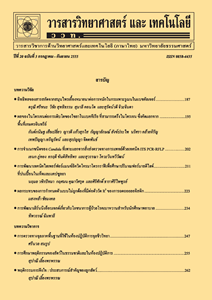ประสบการณ์การเรียนรู้ ปัจจัย และแรงจูงใจของนักศึกษาในการเป็นอาสาสมัครช่วยเหลือผู้ประสบอุทกภัย ณ ศูนย์พักพิงชั่วคราว มหาวิทยาลัยธรรมศาสตร์ (ศูนย์รังสิต)
Main Article Content
Abstract
บทคัดย่อ
การวิจัยครั้งนี้เป็นการวิจัยเชิงพรรณนา เพื่อศึกษาประสบการณ์การเรียนรู้ปัจจัยและแรงจูงใจของนักศึกษาในการเป็นอาสาสมัครช่วยเหลือผู้ประสบภัยพิบัติ ณ ศูนย์พักพิงผู้ประสบภัยชั่วคราว มหาวิทยาลัยธรรมศาสตร์ (ศูนย์รังสิต) กลุ่มตัวอย่างเป็นนักศึกษาคณะพยาบาลศาสตร์ มหาวิทยาลัยธรรมศาสตร์ พบว่าประสบการณ์การเรียนรู้ในการเป็นอาสาสมัครสูงสุด คือ ความภาคภูมิใจในตนเองที่ได้ช่วยเหลือผู้ที่เดือดร้อน (M=4.64, S.D.=0.71) ความสุขจากการให้โดยไม่หวังสิ่งตอบแทน (M=4.58, S.D.=0.76) และเกิดความภาคภูมิใจในวิชาชีพที่สามารถช่วยเหลือผู้เจ็บป่วยที่ประสบความเดือดร้อน ซึ่งบางอาชีพไม่สามารถทำได้ (M=4.54, S.D.=0.72) ตามลำดับ สำหรับปัจจัยและแรงจูงใจที่ทำให้เกิดจิตอาสามากที่สุด คือ ความตั้งใจที่จะให้การดูแลช่วยเหลือผู้ประสบภัย (M=4.57, S.D.=0.80) เป็นโอกาสที่เสียสละและทำประโยชน์แก่ผู้ที่เดือดร้อน (M=4.38, S.D.=0.82) โดยปัจจัยและแรงจูงใจในการทำงานจิตอาสาเชิงคุณภาพ ได้แก่ บุคคลใกล้ชิดรอบข้าง ความเป็นวิชาชีพพยาบาล จิตวิญญาณความเป็นธรรมศาสตร์ ประสบการณ์เดิมในการทำกิจกรรม คณะ/มหาวิทยาลัย จิตสำนึกของตนเอง พัฒนากระบวนการคิดแบบมีวิจารณญาณ สร้างเสริมคุณธรรม จริยธรรม และภาคภูมิใจในความเป็นวิชาชีพพยาบาล จากการศึกษาพบว่าการมีจิตอาสาเกิดจากปัจจัยในตัวบุคคล ซึ่งมาจากอุปนิสัย การอบรมเลี้ยงดู ความคิด ความเชื่อ จิตสำนึกและการรับรู้ความสามารถของตน ร่วมกับปัจจัยสภาพแวดล้อม เช่น การมีตัวอย่างจากบุคคลที่เชื่อถือและไว้วางใจสัมพันธภาพระหว่างเพื่อน การได้รับการปลูกฝังจากครู วัฒนธรรมองค์กร และวิชาชีพ
คำสำคัญ : จิตอาสา; แรงจูงใจ; อาสาสมัคร; ภัยพิบัติ
Abstract
This study was a descriptive study to explore learning experiences, factors, and motivations of student volunteers for helping flood victims at Temporary Shelter, Thammasat University (Rangsit Campus). Subjects were student nurses, Thammasat University. The results showed that the highest perceptions of volunteers about their experiences were prides itself on helping people in trouble (M=4.64, S.D.=0.71) were happy for giving without condition (M=4.58, S.D.=0.76) and were prides on helping patients with flood victims that some other careers could not help (M=4.54, S.D.=0.72), respectively. The highest motivation and factor to have public self-consciousness was their intention to help the flood victims (M=4.57, S.D.=0.80) and perceived the opportunity to serve and sacrifice of those who suffered from flooding (M=4.38, S.D.=0.82), that factors and motivation to promote public self-consciousness included the significant persons, the nursing profession, the spirit of Thammasat University, previous experience in social public activities, development of critical thinking, promoting the pride in the nursing profession. The results of this study showed that the public self-consciousness was contributed from internal factor including personal characteristics, the parenting support, belief, conscience, and their perceive self-efficacy, as well as the environmental factors including the role model from a trustworthiness person, the relationships between friends, the cultivation of public–minded consciousness by the teachers, culture, and profession.
Keywords: public-minded consciousness; motivation; volunteers; disaster


